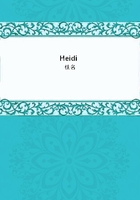
第42章 HEIDI GAINS IN ONE WAY AND LOSES IN ANOTHER(2)
The day came for grandmother's departure--a sad one for Clara and Heidi. But the grandmother was determined to make it as much like a holiday as possible and not to let them mope, and she kept them so lively and amused that they had no time to think about their sorrow at her going until she really drove away. Then the house seemed so silent and empty that Heidi and Clara did not know what to do with themselves, and sat during the remainder of the day like two lost children.
The next day, when the hour came for Clara and Heidi to be together, the latter walked in with her book and proposed that she should go on reading aloud every afternoon to Clara, if the latter liked it. Clara agreed, and thought anyhow it would be nice for that day, so Heidi began with her usual enthusiasm. But the reading did not last long, for Heidi had hardly begun a tale about a dying grandmother before she cried out, "O! then grandmother is dead!" and burst into tears; for everything she read was so real to her that she quite thought it was the grandmother at home who had died, and she kept on exclaiming as her sobs increased, "She is dead, and I shall never see her again, and she never had one of the white rolls!"Clara did all she could to explain to Heidi that the story was about quite a different grandmother; but even when at last she had been able to convince Heidi of this, the latter continued to weep inconsolably, for now she had awakened to the thought that perhaps the grandmother, and even the grandfather also, might die while she was so far way, and that if she did not go home for a long time she would find everything there all silent and dead, and there she would be all alone, and would never be able to see the dear ones she loved any more.
Fraulein Rottenmeier had meanwhile come into the room, and Clara explained to her what had happened. As Heidi continued her weeping, the lady, who was evidently getting impatient with her, went up to Heidi and said with decision, "Now, Adelaide, that is enough of all this causeless lamentation. I will tell you once for all, if there are any more scenes like this while you are reading, I shall take the book away from you and shall not let you have it again."Her words had immediate effect on Heidi, who turned pale with fear. The book was her one great treasure. She quickly dried her tears and swallowed her sobs as best she could, so that no further sound of them should be heard. The threat did its work, for Heidi never cried aloud again whatever she might be reading, but she had often to struggle hard to keep back her tears, so that Clara would look at her and say,"What faces you are making, Heidi, I never saw anything like it!"But the faces made no noise and did not offend Fraulein Rottenmeier, and Heidi, having overcome her fit of despairing misery, would go quietly on for a while, and no one perceived her sorrow. But she lost all her appetite, and looked so pale and thin that Sebastian was quite unhappy when he looked at her, and could not bear to see her refusing all the nice dishes he handed her. He would whisper to her sometimes, in quite a kind, fatherly manner, "Take a little; you don't know how nice it is! There, a good spoonful, now another." But it was of no use, Heidi hardly ate anything at all, and as soon as she laid her head down at night the picture of home would rise before her eyes, and she would weep, burying her face in the pillow that her crying might not be heard.
And so many weeks passed away. Heidi did not know it is was winter or summer, for the walls and windows she looked out upon showed no change, and she never went beyond the house except on rare occasions when Clara was well enough to drive out, and then they only went a very little way, as Clara could not bear the movement for long. So that on these occasions they generally only saw more fine streets and large houses and crowds of people; they seldom got anywhere beyond them, and grass and flowers, fir trees and mountains, were still far away. Heidi's longing for the old familiar and beautiful things grew daily stronger, so that now only to read a word that recalled them to her remembrance brought her to the verge of tears, which with difficulty she suppressed.
So the autumn and winter passed, and again the sun came shining down on the white walls of the opposite houses, and Heidi would think to herself that now the time had come for Peter to go out again with the goats, to where the golden flowers of the cistus were glowing in the sunlight, and all the rocks around turned to fire at sunset. Heidi would go and sit in a corner of her lonely room and put her hands up to her eyes that she might not see the sun shining on the opposite wall; and then she would remain without moving, battling silently with her terrible homesickness until Clara sent for her again.